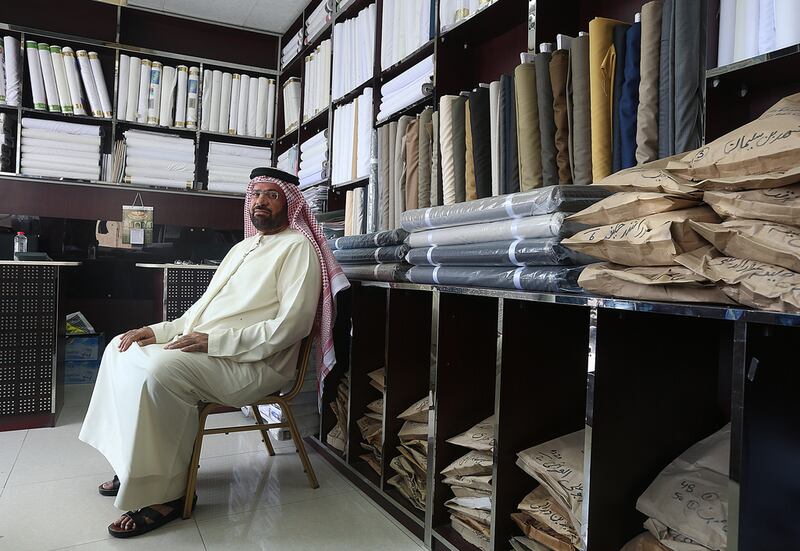The father of Emirati kandura designer Mohammed Al Madani was determined that his son would become anything but a tailor. Sheikh Abdul Rahman Shafei Al Madani had visions of the third of his eight children embarking on a career in medicine or engineering, rather than entering the family thobe business he established in Dubai more than 70 years ago.
“We have a long history of tailoring – my father has been making kanduras since the early 1940s, starting when was just 14 years old,” says Mohammed Al Madani. “He became famous for his speed, his style and customer service.”
Al Madani’s interest in tailoring was piqued at an early age when he would watch his father hand-finishing garments in the family’s modest shop along Deira’s Creekside. Each afternoon, he would rush home from school to complete his homework at the atelier, under the watchful eye of his dad.
“He wouldn’t let me touch anything, not make one stitch,” says Al Madani. “He was very clear about wanting me to finish school. Sometimes I’d manage to sneak off and sit at a sewing machine.”
The family’s store, National Tailors, is now three times its original size but still occupies the same building next to Dubai’s fragrant spice souq. Bolts of fabric cover the wall and brown paper bags containing freshly pressed, custom-made kanduras are neatly stacked, ready for delivery.
“I had developed a complete passion for tailoring from my father and eventually he let me help him a bit by delivering invoices to all the famous customers in Dubai,” says Al Madani.
He did, however, follow his father’s wishes and earned his academic stripes. He went to study in the United States in 1979, before returning to the UAE and forging a successful career as a petroleum engineer.
But he could not deny his passion, and in 1991 expanded National Tailors by opening its first branch in Dubai’s BurJuman Centre. Outlets in Sharjah and Ras Al Khaimah soon followed.
“We were the first to take kandura tailoring into shopping malls and computerise the whole retail system,” says Al Madani, with pride.
“I built a database of our clients and modernised the business, later opening other stores in Mercato Mall and Ajman City Centre. I also started my own tailoring company in 1992 – Al Thawb Al Watani Tailoring. In 2014, I started a new brand, called simply Kandura, focused on making the thobe more fashionable and trendy.”
Al Madani’s creative ambitions for the UAE’s national dress are today showcased in his boutique on Jumeirah Beach Road. Departures from traditional designs include kanduras with double cuffs lined in red gingham, moss-green thobes with prominent chest stud buttons, and white styles with tuxedo dress-shirt pleats.
For the fashion forward, there is a kandura made entirely of soft cerulean denim. It is a prototype for things to come – Al Madani has a jeans-inspired collection of thobes fashioned from sunbleached, stonewashed and sandblasted cotton in mind.
“We’re also adding strips of colour and patterned fabrics to pockets and collars, playing with the thickness of stitching and contrasting threads,” he says.
“Back in the 1950s and ’60s, thobes were almost always white or sometimes off-white. It was Sheikh Mohammed bin Rashid Al Maktoum who moved things forward in the early 1990s. He started wearing colours – dark blues, camel brown, yellow and even black. People liked it and started to copy the style.”
Fifty years ago, kanduras were made almost exclusively of fine, breathable cotton. The soft natural fibres were gradually replaced by polyester-cotton blends from China and Japan, which yielded a glossy, crease-free finish.
“The fabrics seemed so much healthier in the early days – people were heat and health-conscious,” he says.
The UAE remains somewhat unique in the regional kandura market, given that Emiratis almost exclusively have their thobes custom-made.
“Locals here prefer their kanduras customised, especially around Ramadan and Eid,” says Al Madani. “People might order up to 20 pieces at a time and one kandura might cost from Dh200 up to Dh600 for the finest-quality Italian material.” With his father now in his mid-80s but still pivotal to the business, Al Madani is mindful to respect the traditions while keeping the family’s fashion empire “on trend”.
“The next generation is a young, trendy crowd that is open-minded to change,” he says. “They aren’t always wearing the ghutra either, they are happy to sometimes wear caps. With kanduras, things may be modernising at a slow pace, but change is definitely happening.”
rduane@thenational.ae





